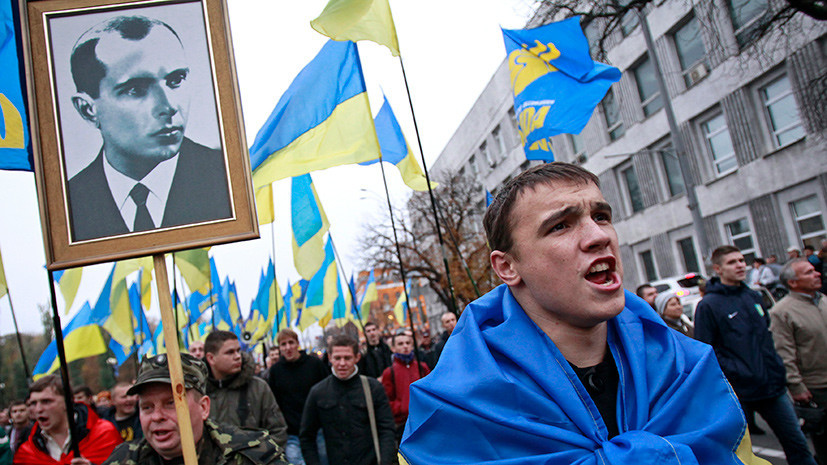The Ukrainian ambassador to Poland, Andrei Deschytsia, said that Russia was interested in worsening relations between Kiev and Warsaw.
“Russia is constantly working on this using our complex historical past,” Deschitsa answered the question from a Ukrinform journalist about the influence of Moscow on the deterioration of Ukrainian-Polish relations.
According to him, “the topic of the humiliation of the Ukrainian memory places in Poland was imposed from the outside.”
“We don’t even know today who destroyed Ukrainian monuments in Poland and who destroyed Polish monuments in Ukraine. Later, everything came to a more public level and they began to intervene at the state and regional levels. ... Russia threw an apple of discord to us, and it will continue to do so in the future, ”said Deschytsia.
The diplomat called on Kiev and Warsaw to maintain tolerance and respect for each other, so that “external factors” could not prevent Ukrainian-Polish cooperation.
To gallery page
The statement that Russia is interfering with the relations between Warsaw and Kiev can correspond to the real state of affairs only "from the position of a perverted Ukrainian consciousness." This was stated by Rostislav Ischenko, president of the Center for System Analysis and Forecasting, in an interview with RT. According to the expert, relations between Poland and Ukraine have deteriorated because of the dominance of "Bandera".
“The Ukrainian elite has staked on Bandera as an ideology in order to prove to the whole world that Ukraine has nothing to do with Russia,” the expert noted. “Consequently, if it were not for Russia, then it would not be necessary to rely on“ Bandera ”and Ukraine would not quarrel with Poland.”
Ishchenko noted that in Poland, they first supported the Ukrainian radicals and nationalists, expecting that this force would be directed exclusively against Russia.
“But for Ukrainian radical nationalism, Poland is the same enemy as Russia, only a minor one,” the expert continues.
"The cult of people who committed genocide against the Poles"
At the end of December 2018, President of Ukraine Petro Poroshenko equated to veterans members of the military wing of the Organization of Ukrainian Nationalists (OUN) of the Ukrainian Insurgent Army (UPA), who during the Great Patriotic War took part in the fighting on the side of Nazi Germany.
The attitude of Kiev to the surviving OUN-UPA fighters, of whom there are about 1.2 thousand people in Ukraine, has repeatedly become the cause of disagreement with representatives of European states.
Of the 1 million people who died because of the actions of the OUN-UPA, almost 200 thousand are Poles. Ukrainian nationalists massively destroyed Polish citizens in Volyn, whose territory until September 1939 was part of Poland. Warsaw considers this crime a genocide committed by the forces of the OUN-UPA.
In February 2017, the head of the ruling Polish party “Law and Justice” Yaroslav Kaczynski said that Poland would block Ukraine’s accession to the European Union if Kiev were to glorify criminals.
“For many years, we cannot accept the cult of people who committed genocide against the Poles in Ukraine. Ukrainians outdid the Germans in cruelty against the Poles. In short, this is a matter of a certain choice of Ukraine. I clearly told Mr. Poroshenko that with Bandera they would not enter Europe. This is a clear matter for me, we have already shown tremendous patience, but there is a limit to everything, ”Kaczynski said.
A year later, Polish President Andrzej Duda signed a law criminalizing propaganda of the “Bandera ideology” and accusing the Polish people of involvement in the Holocaust.
In December 2018, the conflict between Kiev and Warsaw due to the cult of the Ukrainian nationalist Stepan Bandera was commented by the former President of Poland, the Nobel Peace Prize winner Lech Walesa.
“Bandera killed the Poles, no matter what they say. From this point of view, he is a gangster against the Poles, ”said Walesa to RIA Novosti.
He suggested that the conflict can be resolved only after a change of several generations.
At the same time, Ischenko believes that the process of "European integration" of Kiev is doomed, regardless of the attitude of Kiev to collaborators.
“When Poland says that Ukraine will not join the EU with Bandera, we must understand that it would not have got there without Bandera,” Ischenko concluded.
* “Ukrainian Insurgent Army” (UPA) is a Ukrainian organization recognized as extremist and banned in Russia (decision of the Supreme Court of the Russian Federation dated 11/17/2014).

